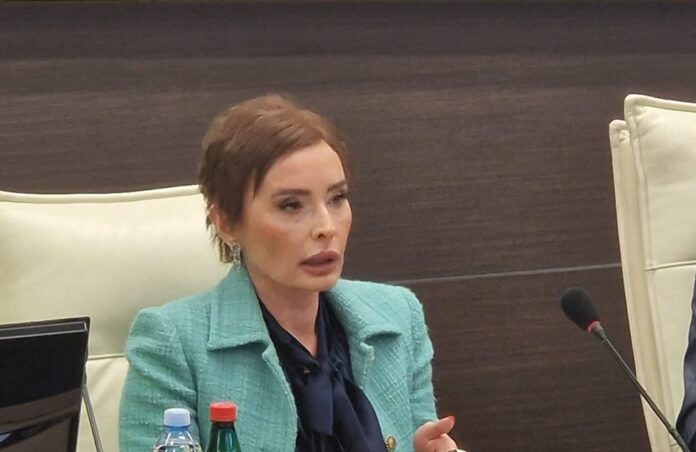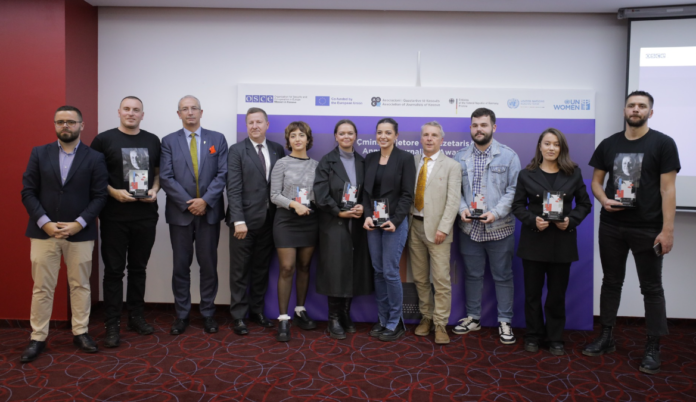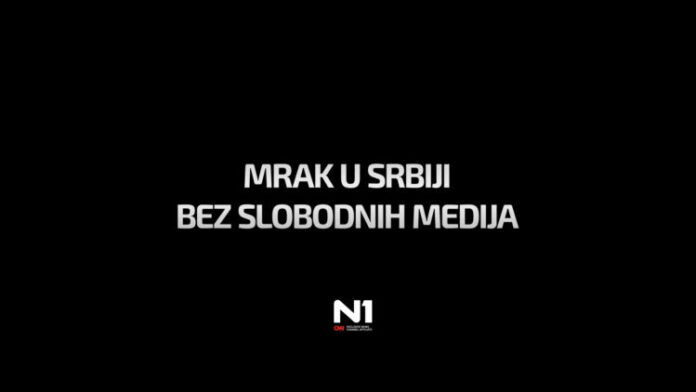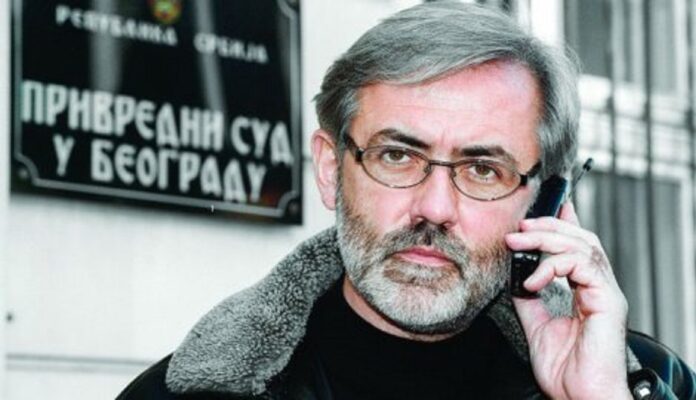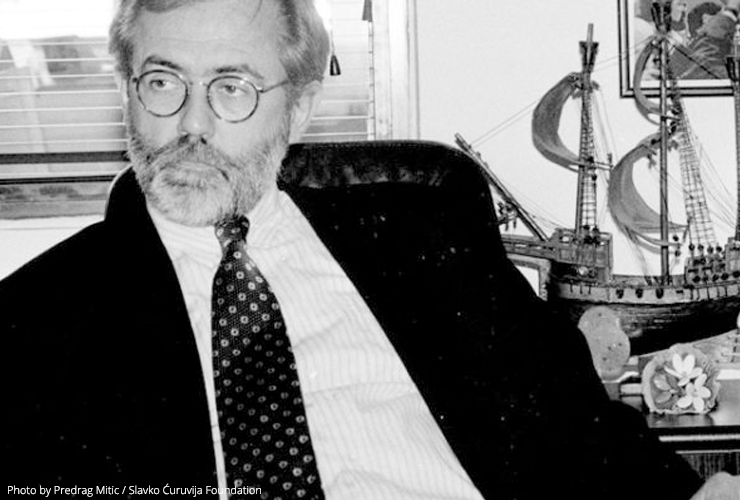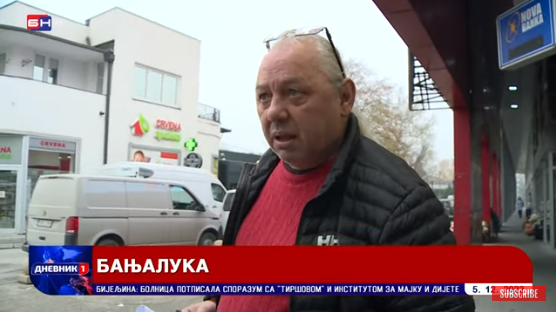Slavko Ćuruvija was killed around 5 pm, in the center of the Serbian capital – Belgrade, in the passage in front of the building where he lived. The Ministry of Internal Affairs at the time announced that “he was killed by a firearm, by unknown perpetrators, and that the workers of the Secretariat in Belgrade are intensively searching for the perpetrators of this criminal act.”
The killing happened during the NATO bombing of FR Yugoslavia. Six days before the murder, the daily newspaper “Politika Ekspres” (part of the system of the state-owned media company “Politika”) published an article entitled “Ćuruvija welcomes the bombs”, containing a horrible lie that Ćuruvija asked the West to bomb Serbia.
The owner of “Dnevni Telegraf” was demonized and branded as a traitor. This defamatory and dangerous article was also read out in full in the then most watched program of Radio and Television of Serbia.
After the murder, “Politika” gave more detailed information and reported the testimony of a citizen who said that “two assailants dressed in black and wearing black caps with facemasks with slits for eyes shot at Ćuruvija.”
After the overthrow of Slobodan Milošević’s regime, information about a State Security secret file was published. The file, under the code name “Ćuran”, revealed that Ćuruvija and his wife in the days prior to his murder had been constantly followed by members of the State Security – in last two days of his life, by 27 security operatives, who were withdrawn from the task just minutes before the murder.
Everything is perfectly clear – both the motives and the background for the murder. However even after 23 years, the fight to punish this crime is still not over.
Eight years have passed since the indictment was filed and the trial began. Monday, December 5, 2022, the Court of Appeal in Belgrade will for the second time begin proceedings on the appealed verdict for murder.
The fight for justice has turned into decades of mortification and agony for the family and friends of the murdered man. The events that followed the process from the indictment and during the years of trial, exposed the insidious and far-reaching tentacles of the darkest side of the deep state.
The trial for the murder of Slavko Ćuruvija has become a symbolic testament to the struggle to punish crimes against journalists and the dark and criminalized parts of the security structures. Many processes in Serbia will depend on the outcome of the current trial.
The Serbian media community is hoping for a decisive court decision, which would be a resounding victory for truth and persistence that would show that the Serbian media profession has the strength to deal with the most difficult topics.
“For family and friends, it would be a small satisfaction, but significant. The stain will be removed from the name of Slavko Ćuruvija. Since we are a divided society, the attitudes of those who think similarly to the parts of the State Security that carried out the liquidations will not change much. However, the legal fact that Slavko was killed by the state because of his political views and the performance of his journalistic work will be confirmed,” states Veran Matić, the president of the Commission for Investigating the Murders of Journalists in Serbia.
Matić adds that “it will be an encouragement for everyone that even after 23 years the perpetrators can be brought to justice”:
“It will hopefully act as a preventive measure to deter potential new killers. It will be an encouragement for the possibility of finding legal solutions for unsolved murders of journalists, even after many years. It will also encourage us to never give up and to use all mechanisms available to us, such as our Commission for the Investigation of Murders of Journalists.”
Targeting journalists as “traitors” and “foreign mercenaries”
The attacks and targeting of Slavko Ćuruvija began in the 90s. In those years, independent media and journalists were under strong pressure from the government of Slobodan Milošević.
“At that time, Milošević had a certain type of protection from the West as a guarantor of the Dayton Peace Agreement,which ended the war in Bosnia and Herzegovina in 1995. In 1997, Milosević closed more than 70 independent radio and TV stations. The following year, great pressure was exerted on the media in Serbia to report on police operations in Kosovo in a way that the government would like,” points out Veran Matić, at the time director of the independent RTV B92, who himself felt the full force of the attack by Milosević’s government.
To ensure state control of news reporting in Serbia, the government of Slobodan Milošević passed the Law on Information in 1998, which institutionalized a legal assault against the media and journalists. The law enabled drastic penalties against independent media to be handed down in courts. The trials were held urgently, and the media and editors were sentenced to enormous financial fines, which they had to pay within 48 hours. If they didn’t pay, all their property would be confiscated. Among the most punished media were “Dnevni Telegraf” and the weekly “Evropljanin” owned by longtime journalist Slavko Ćuruvija.
“In addition to having their property confiscated, Slavko Ćuruvija was sentenced to prison terms. Nonetheless he fought back: The newspaper was printed in nearby Montenegro, smuggled into Serbia, confiscated… until the bombing of Yugoslavia, when in March of 1999, the Ministry of Information officially introduced censorship”, says Veran Matić recalling that “Slavko then told the newsroom that he would not publish newspapers during the bombing of Yugoslavia, because he did not want to publish them censored”.
By that time, the regime-controlled media, reaching the majority of citizens of Serbia, demonized Slavko Ćuruvija. Ten days before the murder, Mirjana Marković, the wife of Slobodan Milošević, labeled this journalist as the main enemy of the state who caused the bombing and ominously announced that “the people would judge him”.
“The climax of the targeting was an article in “Politica Ekspres”. Few days later, Ćuruvija was killed. That shooting and retaliation was a multiple message to all journalists. Months prior to the killing, Ćuruvija had been under State Security monitoring measures, and those measures would be used as an infrastructure for liquidation. According to the indictment, he was killed by members of the State Security, under the direct coordination of the head of the State Security. Everything speaks in support of the claims that the decision to liquidate was made by Slobodan Milošević and his wife Mirjana Marković”, highlights Matić.
The fight for indictment
There was a belief that October 2000. and the change of government in Serbia, would bring a new dawn in the fight against impunity for crimes against the journalist. Especially, when two months after Milošević’s dismissal, a document of a codename “Ćuran” appeared in the public domain, undoubtably confirming the responsibility of the State Security in the murder of Slavko Ćuruvija.
However, in this case (and many others), the road of the rule of law remained – pitch black. The removal of dictator Slobodan Milošević did not bring about a quick indictment.
“The new authorities delayed the changes in the State Security, so there was enough time to remove evidence, but also for a new survival strategy of the State Security Service, which was looking for new allies and continuously obstructed all possible investigations into political and other murders,” says Veran Matić, adding: “However, it is inexplicable why the representatives of the new democratic authorities did not fully investigate and prosecute symbolic cases such as the case of the murder of Slavko Ćuruvija. Nothing was done to create a clear discontinuity with the Milosevic regime, to carry out an urgent and consistent lustration, to change the system, to democratize the services, or to establish transparency and accountability in the work of the State Security servics. We have heard that people at the top of the service have changed, but that it has not been reformed”.
“This”, Matić points out, “was avenged in the most drastic way in 2003, when members of the special unit of the State Security killed the democratic Prime Minister Zoran Đinđić”.
For years, Veran Matić, repeatedly reminded the authorities that impunity could be stopped by establishing a Commission for Investigating the Murders of Journalists (a body that would be composed of representatives of journalist associations, journalists, the Ministry of the Interior, the Security Information Agency, and with the support of the Government of Serbia).
The Commission was established only at the beginning of 2013, and as its priority marked the investigation of the Ćuruvija case. Shortly, the Commission announced that there are more than 2,000 pages of testimonies, evidence and statements related to the murder of Slavko Ćuruvija.
In November 2013, then First vice-president of the Government of Serbia, Aleksandar Vučić (who was Minister for Information in the Serbian government at the time of Ćuruvija’s murder), announced during the renowned political TV show “Utisak nedelje” that there had been recent progress in the investigation of the murder of Ćuruvija and that he expected it to be resolved soon.
On January 14, 2014, Serbian police arrested two suspects in Ćuruvija’s murder case, Milan Radonjić and Ratko Romić, both formerly employed by the Second Department of State Security Service (SDB).
Radomir Marković, former head of the Federal Republic of State Security Service and Miroslav Kurak, currently at large, were also named in the indictment. The former for allegedly ordering the murder and the latter for being the alleged executor.
Trial – A new round of attacks, treats, manipulations and abuses
With the filing of the indictment, a new round of demonization of the victim began. This time extending targeting to members of the Commission for the Investigation of Murders of Journalists as well. The most brutal attack on the president of the Commission Veran Matić, was in 2018 on the front page of one of the media outlets owned by “Politika”.
“The defendants defense at the trial very often used, or alluded to, the arguments used to hunt Slavko in the 90s – that he was a traitor, a foreign mercenary, that he collaborated with criminals. There were also more specific actions. A series of announcements were recorded claiming that the leader of the working group that investigated this case could be assassinated. Very often we received information that data was being accessed without authorization”, says Veran Matić.
During the trial, more than 60 members of the secret service and the police appeared. Among them, almost all 27 agents who followed Ćuruvija in the days before the murder. The deep state was fighting back. The contradictory statements of the witnesses brought confusion into the trial process.
“It was obvious that all the answers were orchestrated, agreed upon, and that the largest number of operatives were “getting out of the situation” by saying that a lot of time has passed, and they don’t remember. Obstruction continued at every level. Leading people from the service, who are not covered by the investigations, continued to work from the protected positions they had been given and to influence witnesses. This happened in other cases as well. According to those from the State Security who gave incriminating testimony, a new smear campaign was being waged. Some of the witnesses also reported threats to their families”, adds Matić.
In July 2017, the court panel abolished prison custody for two accused – Milan Radonjić and Ratko Romić – and replaced it with house arrest and ankle monitors. A year later, the court panel, at the suggestion of the defense, rejected part of the key evidence – data tapes from mobile phone base stations in the center of Belgrade, which showed where the accused were before, during and immediately after the murder of Ćuruvija.
Veran Matić reminds that these data tapes were the central point of the accusation:
“Therefore, the defense intended at all costs to exclude this evidence as illegal or with other explanations. It was a long battle because the judicial panel even made decisions twice that the evidence was illegal, but the higher court returned the evidence as completely legal. This crown evidence, together with other testimonies, represents a sum of evidence sufficient for the final judgment at the Court of Appeal.
And there were many more battles in this case. For example, a struggle to allow leading inspector Dragan Kecman, who contributed decisively to the filing of the indictment, to testify in court. Death threats Kecman received were never investigated.”
100 years in prison
The first trial for the murder of Ćuruvija ended after four years. The verdict came on April 5, 2019 – 20 years after the crime. The following year, the Court of Appeal overturned this verdict. In December 2021, the second verdict was issued.
The judicial panel of the Special Department for Organized Crime of the High Court in Belgrade, in a repeated proceeding, found all four accused guilty of the murder of Slavko Ćuruvija. They were sentenced to a total of 100 years in prison.
Former officials and operatives of the State Security Service Radomir Marković and Milan Radonjić were sentenced to 30 years each, and Miroslav Kurak and Ratko Romić to 20 years in prison each.
However, according to the judicial panel, the instigator, the one who ordered the murder, and the immediate executor, the one who shot the journalist, remained unknown. How is it possible?
“Criminal and forensic processing of the murder scene was done unprofessionally. In a word, everyone knew that it was the work of the State Security, and that the bombing of Yugoslavia was in progress. Quite enough reasons to systematically obstruct the investigation of the murder, which was justified by many. But even without that evidence, the evidence and testimonies collected by the prosecutor clearly indicate that the accused Miroslav Kurak is the executor in cooperation with Ratko Romić and with the organization of the head of the Belgrade State Security Center Radonjić on the order of Radomir Marković, the head of the State Security. This seems not to have been convincing enough for the court panel, despite all the evidence, and they decided to introduce an unknown person as the perpetrator and the others as helpers and organizers. According to our law, it is not allowed to change the indictment in this way. I don’t understand why the court panel did this twice,” Matić points out.
From December 5 to 9 this year, the Court of Appeal will hold a public session regarding appeals against the second verdict. The long history of this court case revealed many obstacles, challenges and complications that were exposed, addressed, and confronted by the president of the Commission for Investigating Murders of Journalists.
Therefore, it is assuring when Matić says that he expects the Court of Appeal to issue a final verdict and sentence the defendants to the same or similar sentences.
“I would like it if Serbia would be the first country that, after 23 years since the murder, has a verdict for the perpetrators of the murder, who come from the very top of the state and the security apparatus, which are usually a protected species. The judgment also decides the fate of the journalistic profession, but it is also a watershed for the judiciary. With the judgment, I believe that we will create space for some new energy for journalism, especially in the fight against impunity for murders of journalists and any violence against journalists”, concludes Matić.
This article has been writen by the investigative journalist Jelena L. Petković. She has been conducting research for many years into the killing and disappearance of journalists in Kosovo. Her work included interviews with more than 200 interlocutors: relatives, colleagues, acquaintances and members of international missions. Her work has contributed to disclose new information on the disappearances and killings.


